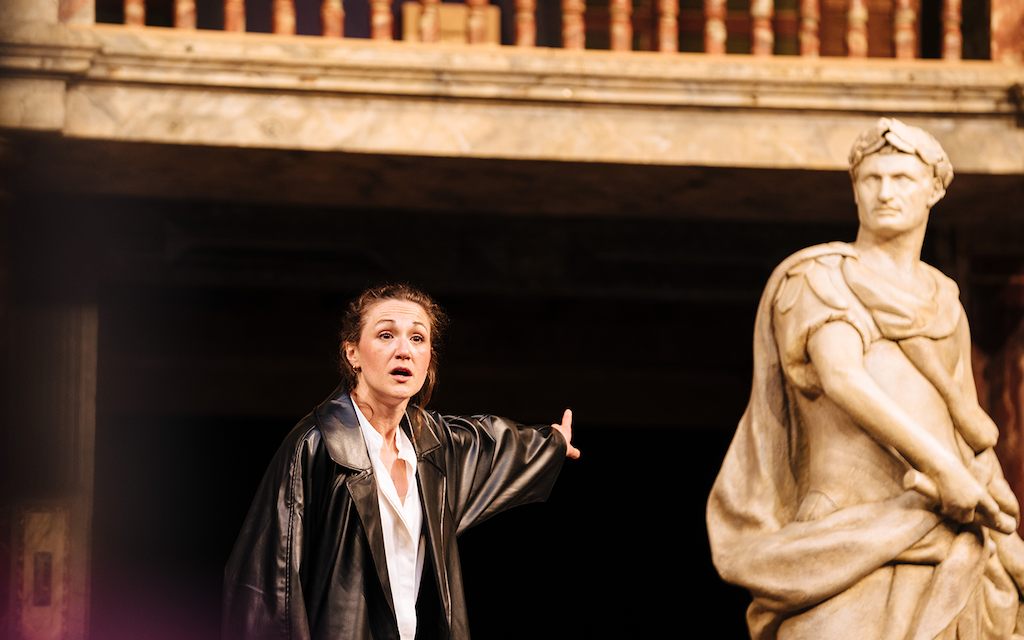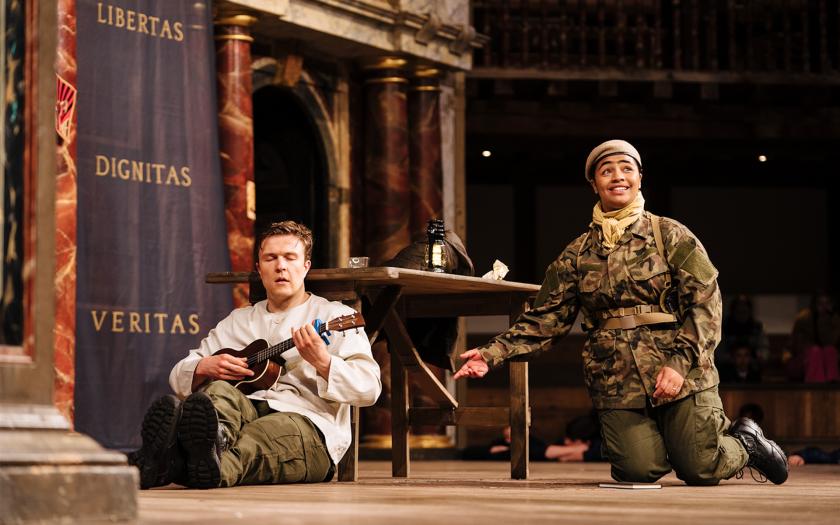With tyrants licking their lips around the world and the question of how to respond to their threat growing ever more immediate, Julius Caesar director Diane Page eyes an open goal – and misses.
A statue stands alone on the stage (this touring production has no set and barely any props) as Caesar struts about, feigning humility, scoffing at a soothsayer’s warning to beware the Ides of March. Cassius, clever but consumed by her distaste for Caesar’s ever-growing threat to the republic with the inevitable demotion of senators like her, plots his murder. Brutus is the people’s favourite, perfect for the cloak of respectability the quasi-regicide needs – she vacillates, but joins the conspiracy.
Mark Antony, a jockish favourite of Caesar’s, is not invited, but, fatally underestimated by the naive Brutus, seizes his chance to foment civil war in the power vacuum that follows the putsch and revenge his friend’s murder while furthering his own ambition.
It’s a great political play, a study of power used and abused, of how good intentions (and good people) can provoke consequences unforeseen. It’s also a study in how news (in the form of the celebrated funeral speeches) can do more than report history – it can make it. But this production fails on just about every level. The gender-flipping – understandable, since Shakespearean acting cannot be so imbalanced in the 21st century – is not just in casting (for example as is the case with Kathryn Hunter, soon to play King Lear, not Queen Lear, on this stage) but in characters too. This leads to a blizzard of pronoun confusion, sometimes tampering with the verse’s metre, but always jarring. Two women at war addressing each other as “Sister” may be the grammatical equivalent of two men addressing each other as “Brother”, but the words do not bring parallel civil connotations. Aesthetically, politically and narratively, the choice to bring the invisible women of Rome to the stage in this way, fatally undermines the play’s structure.
But this production fails on just about every level. The gender-flipping – understandable, since Shakespearean acting cannot be so imbalanced in the 21st century – is not just in casting (for example as is the case with Kathryn Hunter, soon to play King Lear, not Queen Lear, on this stage) but in characters too. This leads to a blizzard of pronoun confusion, sometimes tampering with the verse’s metre, but always jarring. Two women at war addressing each other as “Sister” may be the grammatical equivalent of two men addressing each other as “Brother”, but the words do not bring parallel civil connotations. Aesthetically, politically and narratively, the choice to bring the invisible women of Rome to the stage in this way, fatally undermines the play’s structure.
The text is also delivered in a curiously flat and hurried manner. Anna Crichlow as Brutus maintains the same tone and pace throughout, so there’s little sense of her agonising over the decision to join the conspiracy, nor of her buyer’s remorse afterwards. Charlotte Bate’s lines as Cassius (pictured above) come across at an entirely different volume to Brutus’s, some lost by me in this unique venue. And, as I often find with gender-blind casting in Shakespeare, the pitch of the female voice frequently jars against the speeches which often heave with misplaced machismo – if that’s a price to pay to create opportunities for women in Shakespeare’s histories, so be it, but it’s also a reviewer’s job to report it.
The biggest problem, ironically so in a play that hinges on the capricious reaction of the Roman crowd at Caesar’s funeral, is the failure to manage the audience’s expectations. From the opening moments, the groundlings are recruited into the performance as a kind of ad hoc agora, and actors mingle with the public as senators vie for their favour. But we remain unsure whether to laugh at times (surely there’s too much of such a reaction in so serious-minded a play?) or even whether to boo, pantomime-style. The director and cast need to work out what reactions they want and how to provoke them, because leaving it to the punters’ own devices repeatedly kills the tension with inappropriate giggles and even a sympathetic “Ahh” for the hard-nosed revolutionary, Cassius.
Come the curtain, just when you should be thinking of Donald Trump’s forthcoming re-election campaign, or how (or if) Vladimir Putin’s regime can resolve its Ukrainian disaster, the cast perform an absurd Māori-influenced dance at the curtain, topping off some of the least convincing fighting I’ve seen on the professional stage – knives and guns? – prefaced by some very shoddy saluting.
Julius Caesar is a great play and this is a great time to take it to the country – but this is anything but a great production, so keen to make its own points that Shakespeare’s insights, poetry and drama are entirely lost.















Add comment